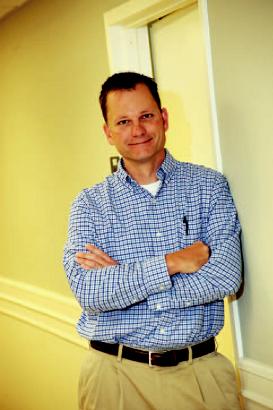Sleep disorder clinic grows past city limits, saves patients money
Sleep disorders are on the rise, and health care entrepreneur and respiratory therapist Matt Hake believes his company, Sleep Diagnostic Services, provides an answer.
Hake founded Sleep Diagnostic Services in 1994 with Tim Hogan, who sold his interest in the company to Hake in 2005.

Hake described obstructive sleep apnea as a condition in which a person’s sleep is disrupted, usually because of some sort of airway obstruction. Airway obstructions prevent continuous sleep, which can lead to a variety of health problems such as excessive sleepiness and high blood pressure.
“People with obstructive sleep apnea can fall asleep on the job, wreck cars because they are falling asleep at the wheel, get in trouble for poor work performance,” Hake said. “There is a high correlation between sleep apnea and stroking.”
Hake pointed to a 1992 congressional study that reported that one out of eight Americans suffers from a sleep disorder, the majority of which went undiagnosed.
That’s where Sleep Diagnostic Services comes in.
“We take people who are suspected of having a sleep disorder; we diagnose them; and we provide treatment for them that allows them to improve their quality of life,” he said.
Originally, the company started as an add-on for full-service hospitals. But Hake found that it was easy for a hospital to let him build a sleep diagnostic practice for them and then cut him out by creating their own in-house program.

“We did it to control our own destiny,” he said. “We are not at the mercy of the hospital contracts.”
Adding the independent facilities was made possible, in part, by insurance company payment schedules that make it cheaper to go to independent labs than to a hospital.
“Let’s say you go to the hospital; your reimbursement rate from the insurance company might be $1,500 to $2,500, whereas our average reimbursement is $600,” Hake said. “(Our cost) is on average a third of the cost of a hospital-based sleep study. Competitively, that’s a big deal.”
For a patient whose insurance policy includes a 20-percent co-pay, for example, this represents an out-of-pocket difference of hundreds of dollars unrelated to quality of care, Hake said.
Today, Sleep Diagnostic Services contracts with nine hospitals and has two independent labs — one in Columbia and one in Lake Saint Louis. Hake said the company employs about 30 people, about half of which are sleep technicians.
“We’ll see about 3,000 patients this year,” Hake said. “My goal is to help 10,000 people a year.”
The majority of the company’s patients come through physician referrals. Hake said his company offers physicians an alternative for patients who say they can’t afford sleep testing.
Dr. Sanjeev Ravipudi, a Columbia cardiologist, said he has been referring patients to Sleep Diagnostic Services for four or five years.
“Some people truly don’t believe they have a sleep disorder,” Ravipudi said. “Sometimes it takes a little convincing to get them screened. Not everyone who gets screened has a sleep disorder, but for those who do, it can make a big difference.”


